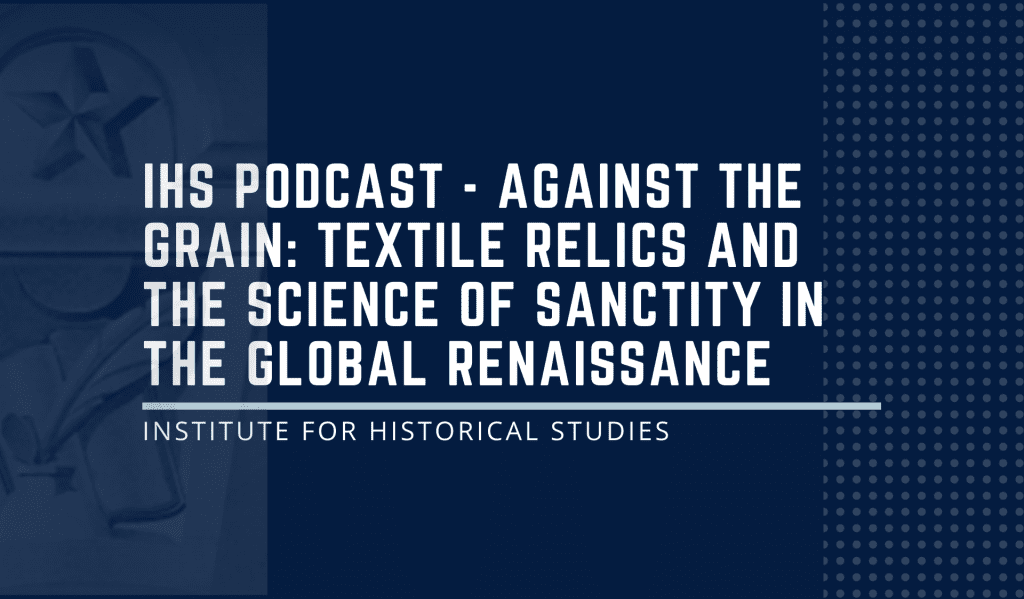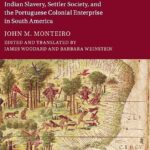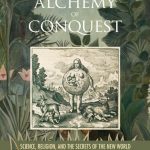
IHS podcasts are a new podcast series initiated by the Institute for Historical Studies’ Director, Dr. Jorge Cañizares-Esguerra. This episode highlights the scholarship of Madeline McMahon, post-doctoral fellow in the Department of History at the University of Texas at Austin. Each episode features Dr. Cañizares-Esguerra and Ashley Garcia, a PhD Candidate in History at UT Austin. This podcast is recorded in connection with a roundtable, “Against the Grain: Textile Relics and the Science of Sanctity in the Global Renaissance,” which will take place on November 22nd. Details can be found here.
Introduction
For most individuals, the Counter Reformation sought to quash new forms of democratic spiritual participation in the form of Lutheranism and Calvinism. The so-called Galileo affair epitomizes this narrative of the Counter Reformation as retrograde and even villainous. In the popular imagination, Galileo stands as the victim of the Counter Reformation’s stifling prosecution of skepticism, experimentation, and modernity.
Yet Dr. Madeline McMahon begs to differ. In her manuscript the Catholic Creation of Early Modern Knowledge, McMahon argues that by creating the institution of the resident (non-absentee) bishop, the Counter Reformation became the lynchpin to the new confessional, interventionist, technocratic early-modern state.
In communication with other bishops and with the help of many clerics, nephews, and humanists, these Tridentine bishops sought to keep control of local parishes and parishioners via visitas regular synods and councils.
Bishops allowed for the rise of highly local forms of authority along with doctrinal, devotional, and legal uniformity (the Catholic dialectics between the local and the universal). Uniformity emerged out of two mechanisms: 1) Bishops and their retinues of learned humanists produced compilations of bishops’ rulings, regulations, and constitutions for other bishops to imitate, and 2) Bishops wrote to each other, creating thick networks of correspondence.
The Bishops spearheaded the modern state through the use of archives and the classifying, assembling, and printing of new legislation. They deliberately used social psychology to promote forms of local social cohesion through collective praying and rituals.
Bishops were at the forefront of new forms of modern hermeneutics by subjecting oral and written tradition on saints and relics to exacting forms of critical analysis. Bishops hired artisans and scholars to investigate relics and saints as objects, using the techniques of natural history, medical anatomy, and experimentation.
Finally, as they sought to create lineages of local bishops and justify their own positions in the city states, bishops encouraged forms of antiquarian research that would eventually give birth to modern forms of historical scholarship.
While rhetorically seeking to cultivate tradition, the Counter Reformation bishop created many of the institutions and practices of modernity.
~ Jorge Cañizares-Esguerra
Guest
Dr. Madeline McMahon is a post-doctoral fellow in the Department of History at the University of Texas at Austin. Her research focuses on intellectual, cultural, and religious history of early modern Europe (ca. 1450 – 1800). Dr. McMahon’s book in progress, The Creation of Catholic Knowledge in Early Modern Italy: Bishops, Their Households, and Diocesan Work, explores the work of bishops’ “scientific” households during the Catholic Reformation in Italy. McMahon’s articles have appeared in International Journal of the Classical Tradition, Journal of the Warburg and Courtauld Institutes, and Past & Present.
Hosts
Jorge Cañizares-Esguerra is Alice Drysdale Sheffield Professor of History at the University of Texas at Austin and the Director of the Institute for Historical Studies.
Ashley Garcia is a PhD candidate at the University of Texas at Austin. Her research includes 19th century political history, American communitarianism, and American political thought. Her dissertation, “An American Socialism: The Associationist Movement and Nineteenth Century Political Culture,” explores America’s most popular utopian socialist program: the Associationist movement of the 19th-century. Ashley has also completed a Portfolio in Museum Studies as her secondary PhD field.
The views and opinions expressed in this article or video are those of the individual author(s) or presenter(s) and do not necessarily reflect the policy or views of the editors at Not Even Past, the UT Department of History, the University of Texas at Austin, or the UT System Board of Regents. Not Even Past is an online public history magazine rather than a peer-reviewed academic journal. While we make efforts to ensure that factual information in articles was obtained from reliable sources, Not Even Past is not responsible for any errors or omissions.



